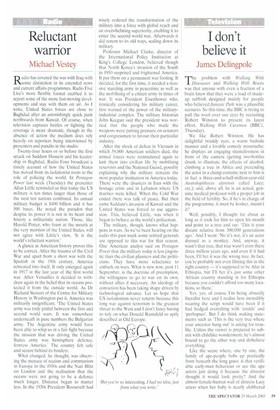Reluctant warrior
Michael Vestey
Radio has covered the war with Iraq with some distinction in its extended news and current affairs programmes. Radio Five Live's more flexible format enabled it to report some of the more fast-moving developments and stay with them on air. As I write, United States forces are close to Baghdad after an astonishingly quick push northwards from Kuwait. Of course, when television captures battles or fighting the coverage is more dramatic, though in the absence of action the medium does rely heavily on reporters being interviewed by presenters and pundits in the studio.
Twenty-four hours or so before the first attack on Saddam Hussein and his leadership in Baghdad, Radio Four broadcast a timely account of how the United States has moved from its isolationist roots to the role of policing the world. In Pentagon Power last week (Tuesday) the presenter Allan Little reminded us that today the US military is ten times larger than those of the next ten nations combined. Its annual military budget is $400 billion and it has 500 bases. He noted the paradox that despite its power it is not in its heart and history a militaristic nation. Those, like Harold Pinter, who foam at the mouth at the very mention of the United States, will not agree with Little's view, 'It is the world's reluctant warrior.'
A glance at American history proves this to be correct. After the trauma of the Civil War and apart from a short war with the Spanish in the 19th century, America retreated into itself. It only emerged again in 1917 in the last year of the first world war. After Versailles it decided to withdraw again in the belief that its oceans protected it from the outside world. As Dr Richard Stewart of the Centre for Military History in Washington put it, America was militarily insignificant. 'The United States army was truly pitiful between the first and second world wars. It was somewhere underneath in pure numbers the Bulgarian army. The Argentine army would have been able to whip us in a fair fight because the mission that was driving the United States army was hemisphere defence, fortress America.' The country felt safe and secure behind its borders.
What changed, he thought, was observing the menace of nazism and communism in Europe in the 1930s and the Nazi Blitz on London and the realisation that the oceans were not going to be a defence much longer. Distance began to matter less. In the 1930s President Roosevelt had wisely ordered the transformation of the military into a force with global reach and an overwhelming superiority, enabling it to enter the second world war. Afterwards it did return to its old ways, scaling down its m ilitary.
Professor Michael Clarke, director of the International Policy Institution at King's College London, believed though that North Korea's invasion of the South in 1950 surprised and frightened America. It put them on a permanent war footing. It decided, for the first time, it needed a massive standing army in peacetime as well as the mobilising of a citizen army in times of war. It was President Eisenhower who, ironically considering his military career, first warned of the power of the militaryindustrial complex. The military historian John Keegan said the president was worried that the people who made the weapons were putting pressure on senators and congressmen to favour their particular industry.
After the shock of defeat in Vietnam in which 58,000 American soldiers died, the armed forces were restructured again to knit them into civilian life by mobilising reservists and the National Guard, possibly explaining why the military remains the most popular institution in America today. There were the disasters in Iran with the hostage crisis and in Lebanon where US marines were killed. When the Cold War ended there was talk of peace. But then came Saddarn's invasion of Kuwait and the United States was forced to use aggression. This, believed Little, was when it began to behave as the world's policeman.
The military, though, knows what happens in wars. As we've been hearing on the radio this past week some retired generals are opposed to this war for that reason. One American analyst said on Pentagon Power that the military today is less jingoistic than the civilian planners and the politicians. They have more reluctance to embark on wars. What is new now, post 11 September, is the doctrine of preemption, the willingness to go to war on its own, without allies if necessary. An ideology of conviction has been taking shape driven by technological advance. Let us hope that US isolationism never returns because this long war against terrorism is the greatest threat to the West and I don't fancy having to rely on what Donald Rurnsfeld so aptly described as Old Europe.








































































 Previous page
Previous page